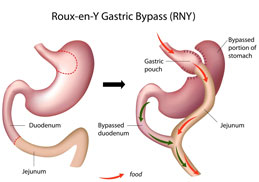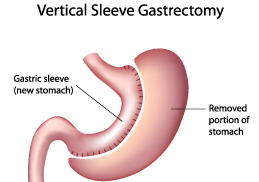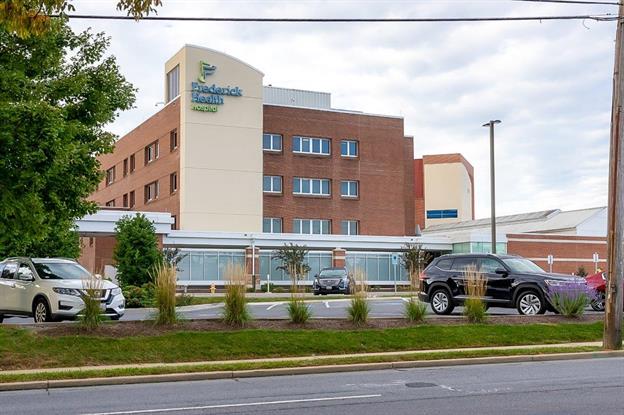Bariatric Surgery
![MBSAQIP-Seal[1]](/images/system/awards/MBSAQIP-Seal[1].jpg) Obesity in America has reached epidemic proportions. It is estimated that
more than 66 percent of the population is overweight or obese. The majority
of these individuals have been battling weight issues or obesity for their
entire lives and, in many cases, are likely to have tried and failed multiple
times to take the weight off and keep it off by way of traditional diet
and exercise.
Obesity in America has reached epidemic proportions. It is estimated that
more than 66 percent of the population is overweight or obese. The majority
of these individuals have been battling weight issues or obesity for their
entire lives and, in many cases, are likely to have tried and failed multiple
times to take the weight off and keep it off by way of traditional diet
and exercise.
People who are affected by obesity are at greater risk for other health problems, such as:
- Type 2 diabetes
- Coronary heart disease
- Stroke
- Hypertension
- Some cancers
- Sleep apnea
- Asthma
- Osteoarthritis, and joint degeneration
- Gastroesophageal reflux disease (GERD)
- Lower back pain
- Urinary incontinence
For these individuals, bariatric surgery may be an option. Bariatric surgery is an operation on the stomach and/or intestines that helps patients with obesity to lose weight. This is accomplished by either limiting the amount of food a person can consume or a combination of limiting intake as well as altering the way nutrients are absorbed by the body.
Since 2009, Frederick Health Hospital has been helping patients on their journey to overcome obesity and to living better, healthier and longer lives. Over the past 10 years Frederick Health has served our community as a Metabolic and Bariatric Surgery Accreditation and Quality Improvement Program (MBSAQIP) Comprehensive Center with the American College of Surgeons (ACS) helping patients on their journey to overcoming obesity.
Please browse our Find a Provider directory to search by specialty.
Types of Gastric Surgeries
 Gastric bypass is the most commonly thought of procedure when bariatric
surgery is mentioned. The bypass restricts food intake by creating a small
pouch with a portion of the top of the stomach. It also decreases how
food is absorbed because the lower portion of the stomach – the
duodenum – that is involved with some of the absorption of calories
and nutrients is bypassed by connecting the small intestine directly to
the newly formed pouch.
Gastric bypass is the most commonly thought of procedure when bariatric
surgery is mentioned. The bypass restricts food intake by creating a small
pouch with a portion of the top of the stomach. It also decreases how
food is absorbed because the lower portion of the stomach – the
duodenum – that is involved with some of the absorption of calories
and nutrients is bypassed by connecting the small intestine directly to
the newly formed pouch.
 A vertical sleeve gastrectomy is a procedure that works mainly by reducing
stomach volume – approximately 80 to 85 percent of the stomach is
removed, leaving a “sleeve” of the stomach, similar to the
shape of a banana. Nutrients and calories are absorbed from food normally,
but patients feel full sooner since the size of the stomach has been significantly reduced.
A vertical sleeve gastrectomy is a procedure that works mainly by reducing
stomach volume – approximately 80 to 85 percent of the stomach is
removed, leaving a “sleeve” of the stomach, similar to the
shape of a banana. Nutrients and calories are absorbed from food normally,
but patients feel full sooner since the size of the stomach has been significantly reduced.
Some people may think that bariatric surgery is the “easy way” to lose weight. There is no easy way to lose weight and there is no guaranteed method, including surgery, to produce and maintain weight loss. Whatever method a patient may choose, the individual must be committed to changing their pre-existing habits around diet and exercise and be willing to continue this for the rest of their lives. If you are considering bariatric surgery, Frederick Health is here to assist you in reaching your goals.
Although most patients enjoy improved mobility, a better self-image and heightened self esteem after weight loss surgery, these results should not be the overriding motivation for having the procedure, says Dr. Stephen McKenna, Medical Director of Bariatric Surgery at Frederick Health.
"First and foremost, our goal is to help patients live better, healthier and longer. People who are living with obesity have gone through a lot," says Dr. McKenna. "They feel terrible physically, and they are often very ashamed about how many times they have failed to take the weight off. I want people to know that they are not alone, and that there are options that we can consider and discuss."
"Bariatric surgery has many life-changing benefits that extend far beyond weight loss,” says Dr. Kubicki, Bariatric Surgeon at Frederick Health. “We will help you choose the best surgery for you and be with you every step of the way.”
-
Joint Works Program
Pre-surgical education to support the best possible outcome for your joint replacement surgery.
Learn More -
Physical Therapy & Sports Rehab
Specialized therapy programs include physical, occupational, speech, pediatrics, and much more.
Learn More




